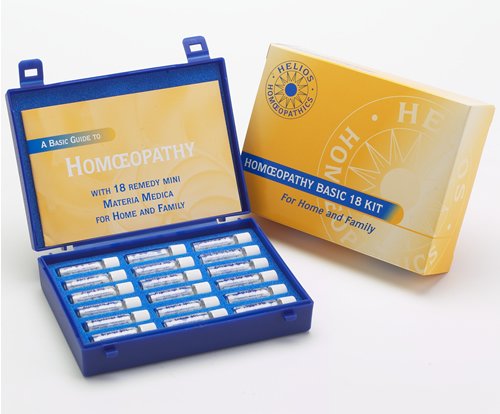When my children were babies, I worried about every cough and fever. I frantically thumbed through my dog-eared copy of How to Raise a Healthy Child in Spite of Your Doctor (a powerfully helpful book written by an iconoclast pediatrician dedicated to the empowerment of parents), and spent hours on the Internet to assuage my anxiety. It was then I stumbled upon the miracle of homeopathy.

Precisely how homeopathic medicines work remains a mystery, and yet, nature is replete with mysteries and with numerous striking examples of the power of extremely small things. Packed into tiny sugar balls the size of cupcake sprinkles, this natural form of nanopharmocology dilutes remedies to the point where there may be no molecules of original substance left. The dilution, combined with rigorous shaking of the substance potentiates the remedy. This is called ‘ultramolecular’ dilution (in other words, way small).
To my delight, my children’s health improved dramatically more with these micro dosages, than with the heavier handed versions of conventional medicines. We are taught more is better, yet homeopathy reveals a radically different principal of physics that supports the view that small is powerful. Just look at the force released in an atomic bomb from smashing two atoms together.
When applied to personal development and organizational change, this principle holds true. Attempting to make positive changes through aiming for large fell swoop goals and achievements is not nearly as effective as making numerous very practical and achievable micro-moves towards an overall vision, calling or dream.
As a horsewoman, I’ve come to see that so many theories that work with eliciting real learning and collaboration for horses, work magically with their human counterparts. The brilliant horseman and trainer (as well as second degree aikido black belt), Mark Rashid, teaches how to ‘reward the try’, which rewards a horse in response to any of his ‘micro-tries’ towards the desired action.
“Because we are constantly looking for the big thing (the flawless lead change, the effortless transition, the sliding stop), we often look right past the most important part–the try that tells us our horse is understanding our request,” he writes.
The more sensitive one becomes to the smallest of tries towards the right thing, and the quicker one rewards those tries, the quicker and more solidly the horse learns and grows. It’s the same for us. The more respect we can give ourselves or each other for the ‘micro tries’, the quicker and more solidly we can grow.
My belief is that inside these micro-tries, no matter how small, is the most powerful of neurological rewards — success. From a neurological point of view (remember, we are talking small here) the bio-chemical stimulus of success is the same, whether it be a tiny success, or a huge one. But tiny ones are easy, and you can rack them up with much frequency. Which means you’ll grow and learn and thrive better, and faster!
For a lot of us, when we try to make big changes for the better, it’s too easy to get disheartened, cheat, and slide back into our old ways. Better to succeed in small ways, more often. A recent study by social psychologist Sung Hee Kim supports this idea. Kim advises undergraduate psychology majors at the University of Kentucky and has an interest in finding ways to help students follow good advice. To that end, she surveyed the various “micro” actions—those requiring little time, effort, or resources—that students engaged in that resulted in positive “macro” life changes.

Students recalled small actions, performed consistently, that they believed produced lasting, broader changes. The kind of micro actions ranged from getting up a bit earlier (10 minutes) in the morning, briefly reviewing course material, to writing down plans and assignments in a planner.
This principle of ‘small is better’ is the reason why, at the end of my sessions with clients I might ask, ‘What’s the one smallest thing you can do?’ I don’t ask for more than one, and I insist that it be as small as possible. Mostly I am met with incredulousness. Did they hear me correctly? Small? But aren’t changes meant to be big, monumental and life changing?
Another fine horseman, Warwick Schiller, reminds us to aim for only 1% improvement per day. ‘In 100 days, you’ve improved 100%,’ he says.
In one of his talks he recounts a story about his wife who suffers from panic attacks. She began working with cognitive behavioral therapy in hopes that it would help. As part of her treatment, every day she had to build her capacity to manage anxiety through creating micro moments of fear. She would sit down quietly, then summons an anxiety-creating trigger—only just enough to bring the anxiety on—and then sit quietly and breathe through that micro-trigger. Over time this created greater capacity to cope.
One day she and Warwick were taking a flight overseas. Warwick fell asleep. When he woke up, she exclaimed that she had had a panic attack, but was able to deal with it, and it went away quickly. They were both amazed that the simple act of practicing through tiny moments of anxiety, resulted in the ability to stop a panic attack on a plane, one of the most challenging places to have one.
The point being that she did not create this capacity by going on to many planes and dealing with the Super Bowl of anxiety producers. She achieved it through many very small successes.
The other day I stumbled into an app called YOU. It’s an app of small steps, micro-actions, to a ‘happier and healthier you’. I downloaded the app and was invited to do my first micro action – to take a moment, get present, look at my surroundings and capture the moment by taking a photo. Simple. Testimonials raving about the app include things like “It’s incredible how much has changed in the last months. Especially when it comes to self-love, leaving my comfort zone, ending procrastination, … or focusing on the right things.”
So, do you want to do something brilliant in the world? Do you want to be awesome, have bright, clear, loving relationships, and leave this world a better place? Start with something really tiny. What is one really small practical thing you can do today to make that happen?
Resources:
Mark Rashid
Warwick Schiller
YOU app

